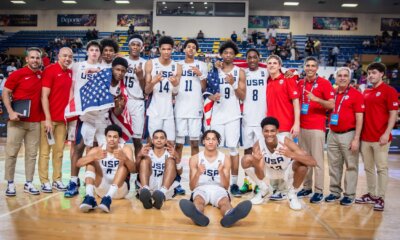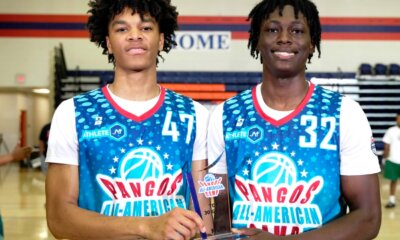LEXINGTON, KY — At this point, it is hard to determine just how talented Kentucky’s young basketball team is or will be by the end of this season. But judging from the fact some 91 GMs, scouts and front office types from 30 NBA franchises made the journey here to watch a first ever NFL-style combine that featured 11 players– 7-0 junior center Willie Cauley-Stein, 6-11 sophomore center Dakari Johnson, 6-9 sophomore forward Marcus Lee, 7-0 freshman forward Karl Towns, 6-8 junior forward Alex Poythrees, 6-9 freshman forward Trey Lyles, 6-9 sophomore forward Derek Willis, twin sophomore guards Andrew and Aaron Harrison and freshman guards Devin Booker and Tyler Ullis– who could someday play in the league.
NBA Draft.net projects three players– Towns (3), Cauley-Stein (14) and Lee (25)– going in the first round and four more– Aaron and Andrew Harrison, Poythress and Johnson gone by the first 40. NBA Draft Express has Towns (3), Cauley-Stein (10), Johnson (21), Andrew Harrison (25) and Aaron Harrison (29) all going in the first round with Poythress selected at 33.
Even though Calipari does not have a No. 1 pick overall the way he did in 2010 (freshman guard John Wall) and 2012 (freshman center Anthony Davis, ths could be John Calipari’s deepest most talented team ever at Kentucky and will likely draw comparisons to the 1996 Kentucky team that won the national title and churned out 11 NBA players , the 1947 48 Cats’ team, which won both the NCAA and NIT tournaments behind the Fab Five of Ralph Beard, Wah Wah Jones, Alex Groza, Kenny Rollins and Cliff Barker and the 2012 37-2 national championship team with freshman center Anthony Davis and freshman forward Michael Kidd-Gilchrist– who were the first two picks in the draft.
With that in mind, here’s a look at the ten most talented teams in the modern history of the game, dating from 1960.
1. UCLA (1968). The late John Wooden called this his best team ever. Who are we to argue? The Bruins were 29-1. Their lone loss was to Houston in mid season at the Astrodome when they played against Elvin Hayes with an injured 7-0 juniior All American center Lew Alcindor, who suffered a scratched cornea in a game against Cal and struggled with his vision. Alcindor, the best player ever in college basketball history, averaged 26 points and 16 rebounds He got his revenge in the national semi-finals when the Bruins buried the Cougars, 101-68 in L.A. Junior guard Lucius Allen, senior guard Mike Warren Jr. junior forward Lynn Shackleford and senior forward Mike Lynn also averaged double figures for the season.
2. UCLA (1973). I personally loved this 30-0 Bruins’ ‘team because it had so much talent that there was no room in the starting lineup for bue chip players like guard Tommy Curtis, centers Swen Nater and Ralph Drollinger and forwards David Meyers, and Pete Trgovich Junior center Bill Walton and junior forward Keith Wilkes were both consensus first team All Amricans and the 6-11 Walton had arguably the best individual performance iever n a champiionship game he shot 21-for-22 and scored 44 points as the Bruins defeated Memphis, 88-67, in St. Louis.
3. Kentucky (1996). Rick Pitino’s 34-2 Cats were the deepest college basketball team in the last 30 years. They lost two regular season games, but they hit their stride, devouring the competition in the NCAA tournament by an average of 21 points. and defeated Syracuse in the national title game at the Meadowlands Three starters from that team– Antoine Walker, Tony Delk, Walter McCarty– were drafted in the first round that June and 11 players from “The Untouchables” eventually made it to the league.
4. Indiana (1976). The Hoosiers, coached by iconic Hall of Fame coach Bob Knight, were the last team to finish unbeaten with a perfect 32-0 record. All five starters– center Kent Benson, forwards tom Abernathy and Scott May and guards Bobby Wilkerson and Quinn Buckner– played in the NBA. IU, which outscored opponents by an average of 17.3 points, secured its place in history when it got a combined 51 points from May and Benson to defeat Big Ten archrival Michigan, 86-68, in the finals. at the Philadelphia Spectrum. May, Benson and Buckner were All America selections in both 1975 and 1976.
5. NC State (1974). This enchanted season was a showcase for David Thompson, a 6-4 forward with a 42-inch vertical leap who were arguably the best player in the history of the ACC over such luminaries as Ralph Sampson, Michael Jordan and Tim Duncan. Thompson’s nickname was “Skywalker” because of his incredible 42 inch vertical leap and he invented the alley oop pass. The Pack had talent, with towering 7-4 center Tom Burleson and tiny, clever 5-8 point guard Monte Towe. But their championship run was filled with drama. The top-ranked Pack (30-1) had to defeat fourth-ranked Maryland, 103-100, in overtime in a classic ACC final just to get an invite to the NCAA tournament, then they had to avenge an 18 point loss to reigning champion UCLA in the national semi-finals at Greensboro. Thompson scored 28 points and grabbed 10 rebounds as the Pack rallied from an 11 point second half deficit to defeat the Walton Gang, 80-77, in double overtime and break a seven year stranglehold the Bruins had on the national championship.
6. Ohio State (1960). All American forward Jerry Lucas, only a soph, averaged 26 points and 16 rebounds on the season, shooting 63 percent from the field. Four other starters John Havlicek, Mel Nowell, Joe Roberts and Larry Siegfried each averaged 11-plus points per game for the young Buckeyes won the Big Ten, then rumbled through the NCAA tournament, beating Cal, 71-51, in the finals. All five starters from that 25-3 team played at least two years in the pros.
7. Duke (1992). Forward Christian Laettner, point guard Bobby Hurley and forward Grant Hill– all lottery picks– were treated like rock stars by their fans during a 34-2 season when Mike Krzyzewski’s Blue Devils became the first team to repeat as national champions since UCLA in 1973 when the defeated Michigan, 71-51, in Minneapolis. Duke was ranked No. 1 the entire season, but needed a last second turnaround jump shot by the 6-10 Laettner off an inbounds pass from Hill to defeat feisty Kentucky, 104-103, at the Philly Spectrum in the best non-title tournament game ever played. Laettner, who developed a reputation as Mr. March, scored 32 points, shooting a perfect 10-for-10 from the field (with two three point jumpers) and went 10-for-10 from the line.
8. North Carolina (1982). The 32-2 Tar Heels, which defeated Georgetown, 63-62, to win Dean Smith’s first national championship in New Orleans, had arguably the best front court in modern history with Michael Jordan, Sam Perkins and James Worthy. Jordan was only a freshman, but he nailed a 16-foot jumper from the left side with 16 seconds remaining to give the Heels a one point lead before Georgetown guard Fred Brown’s errant pass directly to Worthy prevented the Hoyas from attempting a potential game-winning shot in the closing seconds.
9 Georgetown (1984). Towering 7-0 junior center Patrick Ewing– a three-time All American– helped the Hoyas put the Big East on the map when they won the conference’s first national championship with a dominant 84-75 victory over All American center Hakeem Olajuwon and Houston in the championship game. Ewing, freshman forward Reggie Williams scored 19 points and grabbed 7 rebounds in the final were among eight players from that team to be drafted. Ewing was the No. 1 pick overall in 1985 and Williams went fourth overrall in 1987. John Thompson’s 34-3 team– which was filled with defensive stoppers– left the biggest impression in the second half of the Hoyas’ 53-40 victory over Kentucky in the semifinals, completely shutting down down the Cats’ Twin Towers, 7-0 Sam Bowie and 6-10 Melvin Turpin, who finished the game a combined 0-for-12. Georgetown limited the Cats to 3 for 33 (9.1 percent) shooting in the final 20 minutes and Wingate held Kentucky’s Jim Master to 2-for-7 shooting from the field.
10. Kentucky (2012). John Calipari won his first national championship, coaching Kentucky to a 38-2 record and a 67-59 victory over Kansas in the NCAA championship game. Six of Calipari’s players from the team were drafted that June, four in the first round. Freshman center Anthony Davis went 1 overall, freshman forward Michael Kidd-Gilchrist was selected second. Sophomore forward Terrence Jones went 18th and freshman lead guard Marquis Teague went 29th. The Cats won the SEC regular season with a perfect 16-0 record.















